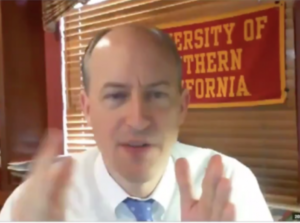 I recently wrote a column in the LLT journal (Language Learning & Technology) looking back at 25 years of the use of technology in language learning. One of the principal developments discussed in the column is the transformation of the World Wide Web, from the heady early days in the 1990s when the web seemed to promise universal access to information and knowledge to the situation we have today in which the online world has become a rich source of misinformation and divisiveness. Social media has been a major contributor to that transformation. Donald Trump demonstrated how Twitter can be a vehicle for spreading disinformation and for engaging in nasty personal vendettas. The pernicious social role played by Facebook and Instagram has become clear in recent media reports, based on leaked internal company documents.
I recently wrote a column in the LLT journal (Language Learning & Technology) looking back at 25 years of the use of technology in language learning. One of the principal developments discussed in the column is the transformation of the World Wide Web, from the heady early days in the 1990s when the web seemed to promise universal access to information and knowledge to the situation we have today in which the online world has become a rich source of misinformation and divisiveness. Social media has been a major contributor to that transformation. Donald Trump demonstrated how Twitter can be a vehicle for spreading disinformation and for engaging in nasty personal vendettas. The pernicious social role played by Facebook and Instagram has become clear in recent media reports, based on leaked internal company documents.
Now Facebook has announced – not that it has seen the light and will adjust its algorithm so as not to encourage acrimony, animosity, and conflict – but that it will become the creator of the metaverse. Facebook is now “Meta”. In my LLT column, I wrote about the metaverse, i.e., the ubiquitous intertwining of physical and online worlds first depicted in Stephenson’s novel Snow Crash (1992). Some commentators have recently pointed to the expansion of gaming platforms such as Fortnite or Roblox as moving in the direction of a burgeoning metaverse. The availability of those platforms on a great variety of devices and systems, from phones to gaming consoles, points to the ubiquity of access needed for this vision. Also needed are other elements already available within Fortnite or Roblox: the ability to have both planned and spontaneous events, to offer a variety of gaming and communication options, to have its own economic system (such as gaming currency) and, importantly, to enable users to carve out within that environment their own space, offering, for example, user-created games.
Apparently, Facebook’s interest in creating a metaverse is in part its commitment to the growth of virtual reality (through the Oculus system it acquired), as VR is a likely priority entry point to a metaverse. But it’s likely as well that the company hopes the announcement will distract from the many issues raised in the media about Facebook and its associated platforms. Additionally, it seems likely that Facebook’s move is an attempt as well to attract younger users, who have flocked to Roblox and Fortnite. Ironically it is that group, especially young girls, who have been shown in Facebook’s own studies to suffer potential harmful results from social media such as Instagram.
Do we want to have a new virtual world built by a company which ignores its own findings about its negative impact, a company that seems to have a focus only on market share and profit? For me, Fortnite and Roblox seem to offer better alternatives, if indeed we are moving towards a metaverse.













